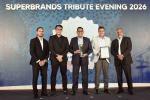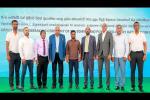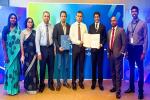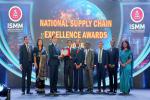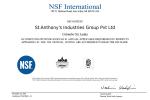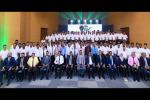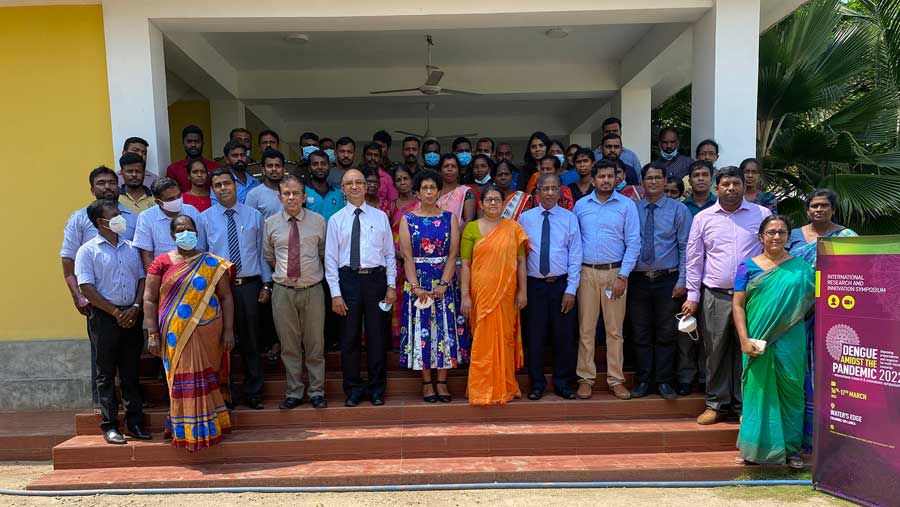The event was also used to look at wider preparedness for multi-hazard scenarios, integrating both biological and natural hazards.
The International Symposium for Research and Innovations on dengue amidst the pandemic was held at Water’s Edge in Colombo, Sri Lanka, on the 16 – 17 March 2022.
The symposium was organised by the Global Disaster Resilience Centre (GDRC) at the University of Huddersfield, UK in collaboration with the Ministry of Health Sri Lanka, including their National Dengue Control Unit, Anti Malaria Campaign, and Disaster Preparedness & Response Division.
Local Universities, the University of Colombo, and the University of Moratuwa, as well as the National Science Foundation of Sri Lanka, co-organised the event.
The organisers have been working together over the last two years as part of a Huddersfield led project consortium of the UKRI/EPSRC funded research collaboration entitled ‘Improving COVID-19 and pandemic preparedness and response through the downstream of multi-hazard early warning systems’.
Like most other countries, Sri Lanka has been tackling several waves of COVID-19 infections over the last two years.
Dengue infections have also been on the rise in Sri Lanka, with the incidence of dengue increasing 20-fold from the year 2000 to 2012 and a further 3-fold from 2012 to 2019.
Informing future pandemic preparedness
Co-Chair of the event, Professor Dilanthi Amaratunga from the Global Disaster Resilience Centre at the University of Huddersfield, noted that, “There is a need for better stakeholder participation and to share research evidence, best practices, and innovations, and develop competencies among all health professionals and other key stakeholders.
The Symposium is helping support the translation of research evidence into practice that can enhance preparedness and response for multi-hazard scenarios.”
Professor Amaratunga also added, “the outcomes of the Symposium will inform future pandemic preparedness planning in Sri Lanka through their Ministry of Health and other health actors”.
The gathered health professionals and experts in disaster risk reduction discussed how recent events, including the COVID-19 pandemic, have highlighted the importance of improving the performance of health systems in combination with other disaster preparedness and response mechanisms.
A combination of keynote addresses, panel discussions and scientific sessions looked at how hazards are spread throughout communities, societies, and economies in complex ways, which contribute to systemic and cascading risks.
They also considered how the impact of COVID-19 has also had a disproportionate impact on disadvantaged groups, including people in poverty and those with underlying health conditions.
Professor Virginia Murray, Head of Global Disaster Risk Reduction at the UK Health Security Agency, delivered a keynote address on Health Emergency and Disaster Risk Management.
Improving multi-stakeholder approaches
The symposium was an opportunity to identify ways to increase pandemic preparedness, as well as to improve multi-stakeholder approaches to collectively examine impacts, co-ordinate health, social, and economic measures, share practices and to learn lessons.
The book is available to download here : http://www.pandemic-mhew.org/index.php/dissemination
Professor Richard Haigh from the Global Disaster Resilience Centre at the University of Huddersfield moderated the interdisciplinary panel discussion that was held on Tackling the complexity and interdependences of systemic disaster risk.
This provided an opportunity to rethink the intersectoral nature of disaster risk management and consider how multiple and cascading hazard threats can be better addressed.
This panel discussion provided a rich discussion around the challenges associated with an emerging and increasingly complex disaster risk landscape.
It also explored some of the experiences and approaches that can be used to strengthen disaster risk governance and tackle this complexity.
The programme also included a series of pre- and post- symposium public engagement events in Jaffna and Rathnapura, Sri Lanka, incorporating citizens perspective on pandemic preparedness and response amidst a multi-hazard situation in Sri Lanka.
These events helped to disseminate essential knowledge, best practices, and skills for preventing COVID-19 and current hazards; and to share community experience and practices on pandemic preparedness and response.
Participants for the two public engagement events included: Community leaders, volunteers from Sarvodaya, Red cross, village committees, Mother support groups and leaders of faith-based organizations.
The University of Huddersfield – Inspiring Global Professionals
The University of Huddersfield has a growing reputation as an inspiring, innovative provider of higher education of international renown.
Researchers at the University of Huddersfield are dedicated to solving the problems and answering the questions posed by industry, science and society as a whole.
The University's research is showcased by world-leading applied research groups in biomedical sciences, engineering and physical sciences, social sciences and arts and humanities.
The University of Huddersfield achieved a Gold Teaching Excellence and Student Outcomes Framework (TEF) award in June 2017.
This award expired in June 2021 and the scheme is currently being revised.
We look forward to being reassessed when the awards are re-opened in 2023.
We won the first Global Teaching Excellence Award recognising the University’s commitment to world-class teaching and its success in developing students as independent learners and critical thinkers (Higher Education Academy, 2017).
Triple proof of teaching excellence: our staff rank in the top three in England for the proportion who hold doctorates, who have higher degrees, and hold teaching qualifications (HESA 2022).
We are joint second for National Teaching Fellowships which mark Britain’s best lecturers in Higher Education, winning a total of 18 since 2008 (2021 data).
In 2021, the University gained a Queen’s Anniversary Prize for its role in advanced measurement in smart manufacturing.
The prize recognised the ground-breaking work of the Centre for Precision Technologies.
In 2019, the University gained a Queen’s Anniversary Prize for the innovative work of the Institute of Railway Research.
This followed the 2015 Queen’s Anniversary Prize for expanding global boundaries in new music.
Recognised as a leader in enterprise and innovation, the University has been the recipient of the Times Higher Education magazine’s awards for the University of the Year, Entrepreneurial University of the Year and Outstanding Leadership and Management and also a recipient of a Queen’s Awards for Enterprise.
The University has been awarded an overall 5 Star rating from QS Stars, which renders the university’s rating as world-class in Teaching, Employability, Facilities, Innovation, Internationalisation and Inclusiveness.
The University annually enrols over 19,000 students to an increasingly multicultural campus that welcomes students from over 120 countries on to a range of undergraduate and postgraduate programmes across subjects covering…
…the sciences, engineering and IT
…health, education and the social sciences
…business, management, law and accountancy
…architecture, design, humanities and the arts.
